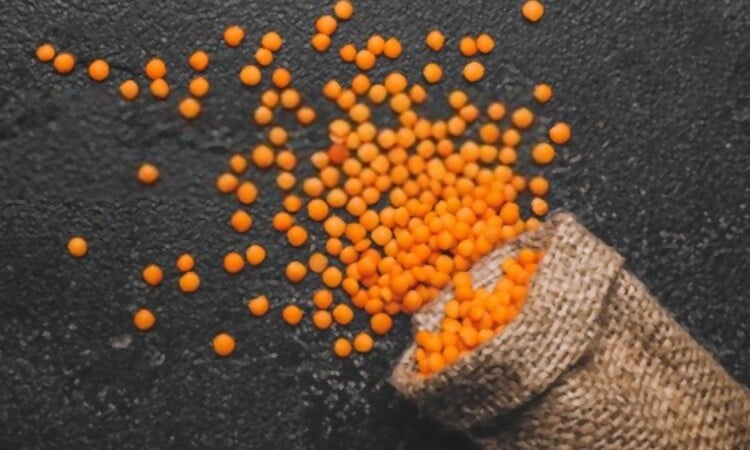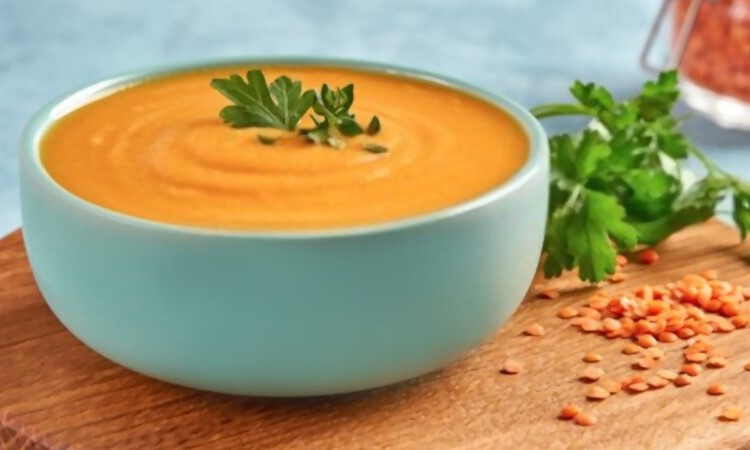As one of the most valued ingredients in the Indian kitchen, dal holds an important place in many households. Most dishes are incomplete without a ladle of dal. Be it a plain dal with rice, dal with vegetables, or dal with green leafy vegetables, dal can be cooked in various variations. Having said that, out of all varieties, the benefits of masoor dal during pregnancy are abundant.
Toor dal plays an important part in preparing the south Indian delicacy – Sambar. Similarly, Maharashtrians love amti dal while Gujaratis love khatti meethi dal. Whatever the food is prepared, all varieties of dal constitute a high value of protein and are heaped with the richness of nutrition.
So, if you are searching about eating masoor dal during pregnancy, this post is about you.
Can I Eat Masoor Dal During Pregnancy
Masoor dal or black masoor dal during early pregnancy can be eaten as it does not have any adverse side effects. Also, it is considered to have abundant health benefits during pregnancy as it is a rich source of iron. Hence, it helps in preventing pregnancy-related anemia.
Related Reading: Benefits Of Saffron During Pregnancy
Also, masoor dal is a good source of folate which helps in preventing birth defects and helps in the development of the fetal nervous system1.
Either way, masoor dal is a powerhouse of vitamins, minerals, and macronutrients like protein. A bowl of masoor dal during pregnancy helps you meet the nutritional and dietary requirements of an entire meal.
What Nutrients Make Masoor Dal During Pregnancy A Healthy Food?
Dals have various positive effects on consumption. Masoor dal is one dal that is not only easy to cook but is also tasty owing to its tinge of sweetness. Being abundantly rich in iron and protein, masoor dal during pregnancy is a perfect go-to option for vegetarians. Owing to its nutritional and dietary benefits, it must be included regularly in a vegetarian diet.
Calculate Due Date With LMP
Lentils are rich in proteins. It is through lentils, a major part of the protein demands of the body are met. These are also rich sources of soluble fiber. It is believed that masoor dal has the highest level of protein. Also, masoor dal is a good source of carbohydrates, proteins, fibers, vitamins, and other micronutrients2.
Listed below is the nutritional value of masoor dal3.
Portion Size 140 g Amount Per Portion 181 % Daily Value * Total Fat 0g 0 % Sodium 20mg 1% Total Carbohydrate 20g 7% Dietary Fiber 6g 21 % Protein 10g 20 % Calcium 99mg 8 % Iron 1.3mg 7 % The % Daily Value (DV) tells you how much a nutrient in a serving of food contributes to a daily diet. 2000 calories a day is used for general nutrition advice.
1. Masoor dal is rich in carbohydrates

Masoor dal includes a total carbohydrate content of 20 g, out of which there are 6 g of dietary fiber. Carbohydrates give you much-required energy and can be an important source of fiber, especially when during pregnancy when energy is simply sapping. It helps to keep your gut healthy4.
2. Rich in protein
Protein during pregnancy is required to fulfill basic functions like muscle growth, wound healing, and cell signaling. Protein also helps your baby’s development, since amino acids are required for normal cell growth and function5.
3. Good source of fiber
Masoor dal is a rich source of dietary fiber and is low on the glycaemic index. Fiber string pregnancy is important as it stimulates the digestion process and prevents instances of constipation, bloating, and other digestive issues.
They also play an important role in maintaining the pH balance of the intestines. The high fiber content also makes them very filling which helps appetite control6.
Related Reading: 9 Normal Early Pregnancy Pains
4. Rich in magnesium
Magnesium and folate present in red lentils keep the heart healthy and reduce the risk of heart disease. Magnesium helps to increase blood flow and oxygen supply in the body. Foods rich in magnesium could reduce fetal growth restriction and preeclampsia. It also helps to increase birth weight of the baby7.
Benefits Of Eating Masoor Dal In Pregnancy
Using lentils like masoor dal in cooking isn’t a new forte as this has been part of our routine vegetarian diet since times immortal. The benefits of masoor dal during pregnancy are limitless as not only it is easily available but is also loaded with the nutrients that are required for the body.
The intake of whole masoor dal during pregnancy is a crucial food as it contains a rich source of iron and folate. Similarly, eating black masoor dal during early pregnancy gives you the much-required proteins and other minerals during your pregnancy period.
Here are some health and nutritional benefits of masoor dal during pregnancy.
1. Helps to strengthen bones and teeth
Masoor dal is a rich source of nutrients such as calcium and magnesium which is important for preserving healthy teeth and bones. Some studies have indicated associations between inadequate intake of calcium or magnesium and high blood pressure, preterm delivery, and intrauterine growth retardation. Masoor dal during pregnancy helps pregnant women to meet their calcium and magnesium levels8.
Related Reading: Can Dental Problems Cause Miscarriage?
2. Masoor dal helps lower cholesterol
Cholesterol helps in stimulating steroid hormones, such as estrogen and progesterone, which are vital for carrying a pregnancy. High cholesterol has had adverse effects, both in the womb and later in life. Due to its high fiber content, masoor dal helps in reducing cholesterol and decreasing heart-related issues9.
3. Promotes better gut health

Masoor dal during pregnancy regularizes bowel movements and protects the body from any digestive issues such as constipation, bloating, and stomach ulcer. Dietary fibers are required to function in a better way and protect us from any digestive ailments which are found high in masoor dal.
4. Masoor dal is a rich source of folate
Lentils are a good source of potassium, fiber, and folate. Folate is needed to produce healthy red blood cells and is critical during periods of pregnancy and fetal development. Folate is also referred to as vitamin B9 and helps prevent some diseases10.
Related Reading: Green Tea And Folic Acid Absorption During Pregnancy
5. Helps to reduce the risk of chronic diseases
Lentils are a good source of protective plant compounds called phenols. According to a study, regular eating of lentils reduces your risk of chronic diseases such as diabetes, obesity, cancer, and heart disease11.
6. Helps to manage blood sugar levels
Legumes and lentils have a low glycaemic index (GI)12. This helps to slow the rate at which the energy supply is released into the bloodstream. Regularly consuming masoor dal during pregnancy helps to improve blood sugar management.
7. makes your food nutritious
Masoor dal is a power-packed food that is filled with folate, fiber, iron, and potassium, as well as manganese – a mineral that helps to normalize brain functions. Consuming as little as half a cup of lentils per day can significantly enhance your diet quality.
Related Reading: Eating (Black Gram) Urad Dal During Pregnancy- Benefits, Safety, And Risks
8. Masoor dal improves digestive health
Masoor dal has anti-inflammatory properties that prevent the accumulation of gas. This dal is easy to digest and is an excellent food to maintain a healthy body.
Precautions To Take When Eating Masoor Dal During Pregnancy
Your diet before pregnancy will help the baby grow better and aid in the development of their health in the future. Though there are no significant side effects from eating masoor dal during pregnancy, anything adverse could always have its impact.
There are a few precautions that you need to follow before consuming masoor dal.
1. Do not eat it raw
Raw lentils can be hard to digest and could cause digestive distress. Lentils, such as masoor dal, contain phytic acid which curbs the absorption of important minerals, making them unavailable for absorption into the body. To reduce Phytic acid content, you can soak and cook. Therefore, it is advisable to soak and cook lentils before use13.
2. Masoor dal could cause gas, flatulence
Excessive consumption of masoor dal might cause flatulence due to the presence of sugars (raffinose, stachyose) – which are not easily digestible. These sugars are fermented by the bacteria present in the gut which in turn leads to intestinal gas and causes flatulence.
3. Could cause allergy
Masoor dal might cause allergic reactions in some individuals due to the presence of certain allergens14. This could be better avoided by boiling it before cooking.
Related Reading: 9 Natural Remedies For Allergies During Pregnancy That Are Perfectly SAFE
Conclusion

According to our Nutritionist, Sushree, Masoor dal is an excellent nutritious legume rich in protein, folate, and iron, all essential for a healthy pregnancy. Folate helps prevent neural tube defects in the developing baby, while iron supports red blood cell production and oxygen delivery. Protein is crucial for building and repairing tissues in both mother and baby. Masoor dal is a simple and versatile ingredient, making it a great addition to your pregnancy diet. However, be mindful of portion sizes. While moderate consumption is beneficial, excessive amounts can lead to bloating, gas, and cramps. Masoor dal also contains goitrogens, which can interfere with thyroid function in high quantities. To maximize benefits and minimize potential issues, remember to wash and clean the dal properly, soak it for few hours and then use it for cooking.
For precaution, it is better that you consult with your doctor and then include it in your diet.


